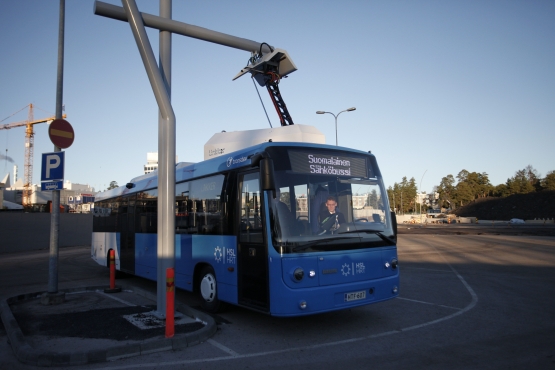
HSL will purchase a total of 12 buses from Linkker Oy, some of them to serve also on bus routes in Helsinki. The first buses are built individually in Linkker's own production facilities in Nastola and in Fortacon’s facilities in Sastamala.
"We made an exception and bought the buses ourselves, because it would have been unreasonable to place the technology risk on a transport operator,” says Reijo Mäkinen, Director of HSL's Transport Services Department. This arrangement also enabled HSL to test and develop new passenger services on their own buses and to try out various installations.
HSL’s goal is to sharply increase the number of electric buses so that in 2020, electric buses would account for 10 per cent of vehicles serving on bus services procured by HSL, for 30 per cent in 2025. HSL has committed to implementing measures for sustainable development until 2050 with the aim of achieving a carbon neutral society. Electric buses support HSL’s strategic goal to increase the share of low-emission transport.
Linkker is the first Finnish fast-charging electric bus. The batteries are charged at end stops while passengers board, while until now, electric buses have been charged at depots. The batteries only need about 1.5-3 minutes to charge.
As the batteries of the fast-charging buses are smaller in size than those loaded at depots, the buses are lighter and thus, the weight does not limit passenger capacity. The buses are highly energy-efficient: the energy consumption of traditional diesel buses is over 3 kWh per kilometer, while Linkker only uses 1.05 kWh per kilometer.
In addition, the buses have a full-aluminium body so they are light compared to buses made from steel.
The Linkker buses are part of the ePeli project, which is a spin-off of the eBUS project coordinated by the Technical Research Centre of Finland (VTT) and the Finnish Funding Agency for Technology and Innovation (Tekes). In addition to HSL, the projects involve the city of Espoo and Transdev Finland Oy, which operates route 11. In the pilot on route 11, HSL and its partners in cooperation test the fast charging system as well as the use of electric buses in urban traffic.
Transdev Finland Oy has participated in the eBUS project from the onset as an active developer.
VTT has been involved in the development of electric buses right from the start. VTT equips the Linkker buses with data collection devices and monitors the battery charge levels with the help of a real-time monitoring and control system.
Espoo has financed the charging device and provided five million euros for the development of electric bus services. One the Metro starts carrying passengers from Espoo to Helsinki in August 2016, most of the bus routes in southern Espoo will be turned into feeder services to Metro stations.
“The city’s goal is that, in future, as many of the feeder services as possible are operated with electric buses. If the HSL contract on the Metro feeder services in Matinkylä is awarded to an electric bus, Espoo is prepared to provide a charging point for the bus right from the beginning. In addition to the Matinkylä terminal, Espoo is planning to introduce charging points, for example, in the Tapiola and Espoonlahti terminals,” says Pasi Laitala, Director for Sustainable Development, City of Espoo.
Electric buses are a step towards zero-emission public transport because the energy they use can be produced, for example, by wind power. Small energy consumption decreases the operating costs of the buses. Electric buses are also quiet.
“Linkker combines strong expertise in electric vehicles and manufacturing of light-frame vehicles. The introduction of electric buses will improve air quality and passengers’ service experience in the metropolitan area. They also make public transport more attractive increasing passenger numbers,” says Kimmo Erkkilä, Linkker’s Managing Director.
Linkker bus
- 11.8 meters long
- Weight about 9.500 kg
- Number of seats 36-40
- Battery capacity 55 kWh
Read more: